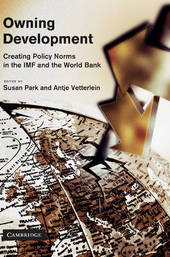
|
Owning Development: Creating Policy Norms in the IMF and the World Bank
Hardback
Main Details
| Title |
Owning Development: Creating Policy Norms in the IMF and the World Bank
|
| Authors and Contributors |
Edited by Susan Park
|
|
Edited by Antje Vetterlein
|
| Physical Properties |
| Format:Hardback | | Pages:306 | | Dimensions(mm): Height 229,Width 152 |
|
| Category/Genre | Development economics
Banking |
|---|
| ISBN/Barcode |
9780521198950
|
| Classifications | Dewey:332.1532 |
|---|
| Audience | | Professional & Vocational | |
|---|
|
Publishing Details |
| Publisher |
Cambridge University Press
|
| Imprint |
Cambridge University Press
|
| Publication Date |
7 October 2010 |
| Publication Country |
United Kingdom
|
Description
As pillars of the post-1945 international economic system, the International Monetary Fund (IMF) and the World Bank are central to global economic policy debates. This book examines policy change at the IMF and the World Bank, providing a constructivist account of how and why they take up ideas and translate them into policy, creating what we call 'policy norms'. The authors compare processes of policy emergence and change and, using archival and interview data, analyse nine policy areas including gender, debt relief, and tax and pension reform. Each chapter traces the policy norm process in order to shed light on the main sources and mechanisms for norm change within international organizations. Owning Development details the strength of these policy norms which emerge, then either stabilize or decline. The book establishes valuable insights into the strength of current development policies propounded by international organizations and the possibility for change.
Author Biography
Susan Park is a Senior Lecturer of International Relations at the University of Sydney. She is the author of World Bank Group Interactions with Environmentalists (2010). Dr Park has published widely on change in international financial institutions.
ReviewsReview of the hardback: 'A carefully crafted and researched anthology that will be a 'must read' for anyone interested in international institutions and their policies in the post-Washington consensus period. It should also be read with profit by those interested in the role of ideas in policy making, as it goes well beyond the dominant 'diffusion' or 'internalization' approaches, and thus opens up a new research agenda.' Friedrich Kratochwil, European University Institute Review of the hardback: 'This very strong volume makes a clear and distinct theoretical contribution in exploring how the World Bank and International Monetary Fund adopt and spread norms. The individual chapters are based on an impressive amount of interview and archive material, written by authors with deep expertise in the field. The book marks a major contribution to the study of international organizations and international relations theory more generally.' Jason Sharman, Griffith University Review of the hardback: 'In this book Park and Vetterlein have assembled the next generation of academic leaders in international relations and political economy. They take the study of international organisation to a higher plane of insight by analysing the internally generated ideas and norms of the IMF and World Bank that drive global policy.' Diane Stone, University of Warwick, Central European University and University of Western Australia
|